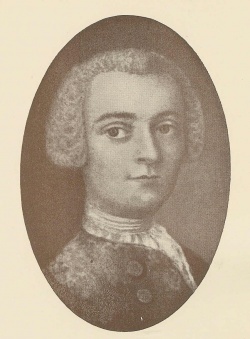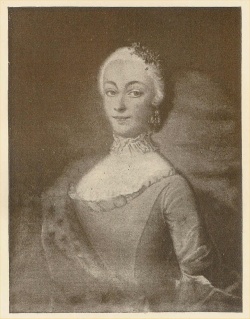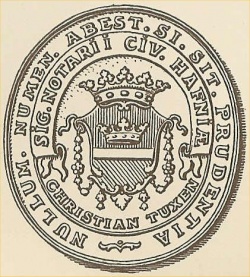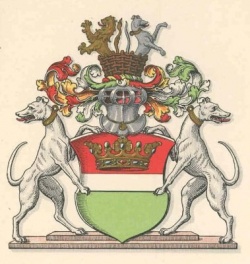A Wiper in the Bosom - Broken Seals 5
01. Nov. 2006

Portrait of Christian Møller Friis de Tuxen (1713-92) as a young man, miniature, originally a brace-let, now a broche. Unknown artist.
The 1740's were a menacing time for Denmark. When Peter the Great's youngest daughter, Elisa-beth, seized power in Russia by a coup d'état in 1741, she appointed the 13-year-old Duke of Hol-stein-Gottorp, Karl Peter Ulrich, grand duke and heir to the Throne - a boy who kept his family's deep hatred of Denmark alive. In 1743, Sweden made peace with Russia after a short, bloody war that had driven the Swedes out of Finland, and as the peace negotiations coincided with the succession election in Sweden, the choice fell on another nobleman of Gottorp, Adolf Frederik, as Swedish successor to the Throne. Denmark was now surrounded by hostile powers.
In 1743, Denmark had gathered a strong army at the Swedish border in order to put pressure on the neighbouring country for a permanent solution of the Schleswig-Holstein question where the Danish King was still claiming supremacy towards the Dukes of Gottorp; but in the autumn of 1743, the former enemies, Sweden and Russia, united against Denmark. To the government in Copen-hagen clever and balanced diplomacy was more important than ever.
The Russian envoy in Copenhagen was Baron Johan Albrecht von Korff, a strong personality, who was very negatively disposed towards the Danish King. Von Korff was a key figure in the relationship between Russia and Denmark. To know and be able to influence what was going on in his mind and house was of great importance to the government.

Christiane Elisabeth de Tuxen, née Jørgensen (1723-96). In his autobiography Friis describes his wife as a strong woman, whom he consulted consistently in matters of espionage, and who often made the difficult decisions for him. However, at an episode when Korff threatening suggested know-ledge of Friis's espionage, she had a breakdown and for the rest of her life she suffered from re-curring "hysteria" and anxiety
The Spy
In the autumn of 1742 Christian Moeller Friis (1713-92) was looking back upon a career that had never really got started. The young theologian had tried to obtain a position in the Government Depart-ments, but without much success, and his greatest asset was his connection with von Korff. Friis's sis-ter-in-law had married the Baron's secretary, Adam Olsufiew, and both he and the Baron were so pleased with the young man that they wanted him to serve Russia. He often came in their house, but one day in October 1742 an incident occurred that would change his life: He overheard a subdued conversation in a window recess between Prus-sian and Saxon diplomats discussing a secret treaty.
Through his landlord and friend, Andreas Lowson Bentzon, Friis had a message sent to the Court where it was not taken seriously in the first in-stance. However, two months later when it proved to be true, Friis was immediately hired as a spy.
In his memoirs he describes his remorse at hav-ing to spy against his friend and benefactor - he disliked it fervently as he "was by God's grace nat-urally honest, grateful, candid, and without false-ness". He found these qualities incompatible with spying, but the King maintained that there was nothing deceitful or dishonourable about obeying one's sovereign. During the following three years Friis consequently sent in spy reports several times a week in which he circumstantially described everything that happened in the Russian's life. Strolls in the King's Garden, dinner and tea parties with other diplomats, and even the Baron's dreams were delineated in the several hundred letters which are today preserved in the Danish National Archives in Copenhagen.

Christian Møller Friis de Tuxen's seal.
Secret Envelopes
Friis was particularly interested in von Korff's letters. He began every report with a survey of which letters von Korff and the other diplomats had sent and received, what their seals looked like, and which cover addresses or front men they made use of in their correspondence; all of it useful information for the letter-openers at the post office who were to select which letters should be opened. Because the Baron's letters were naturally read clandestinely before they were allowed to leave the post office.
Von Korff realized at an early stage that somebody was tampering with his letter - but it did not bother him very much. Not even in the autumn of 1743 when menace of war was bearing down on the Danish-Russian relationship. "At the dinner table Baron von Korff said that this morning he had re-ceived four letters via Sweden which had all been broken here [in Copenhagen]", Friis writes. "He laughed that the contents that were not enciphered would be like pepper in the nose whereas they would probably disregard the enciphered passages as they had no-one in this town with any knowledge of deciphering".
He was right about his last assertion. However, what von Korff did not know was that only ten days earlier the spy had sent his government an exact copy of the cipher key. For more than six months Friis had tried in vain to get close to the key, but he had finally succeeded, presumably because he had bribed his brother-in-law, the secretary, with 500 ducats. His relationship with his brother-in-law was apparently ambiguous. There seems to have been a kind of tacit understanding that Friis could be present when the brother-in-law was working, but that he was not allowed to see entire letters: "when my brother-in-law was occupied with deciphering and I was standing behind him, I noticed among other things roughly ...", Friis writes several times.
On the whole the reports from Friis reveal a surprisingly relaxed attitude towards confidential political letters in the Baron's house. Often they were just lying about, or von Korff was reading them in the presence of strangers. One day when he had tea with the Prussian envoy, the servant came in with his newspapers and letters. While Friis read the papers, the Baron opened the letters, and when his barber came in shortly afterwards, von Korff leaned back and had a shave enabling Friis to read the letters on the sly.

The coat-of-arms of the noble family Tuxen. Christian Møller Friis was ennobled "de Tuxen" for his achievements as a spy. He got the aristocratic name because his wife Kristiane was a distant re-lation of the Danish war hero Lorentz Tuxen. Friis received many distinctions and titles, but only little economic reward for his espionage and he died a poor, bitter man.
The Intelligence Network behind Friis
Friis delivered his reports to and received instruc-tions from Andreas Lowson Bentzon who in turn reported to royal valet Johan Christian Schroeder who organized the secret postal espionage and was in close contact with Minister of Foreign Affairs Johan Sigismund Schulin. It is interesting that the four men shared a past in the postal service where they had served (Schulin as a director) ten years earlier. Like in Erlund's time there was a close al-though discrete connection between the confiden-tial people of the Post Office and of the intelligence service.
By means of knowledge achieved from von Korff's letters and because von Korff gradually became more positively disposed towards Denmark - and not least thanks to his friendship and conversa-tions with Friis - Danish diplomacy succeeded in creating a sensible relation with the Russian Chancellor, Bestuchev. The crisis blew over, and in 1747 the two countries were able to sign a moder-ate alliance treaty.
This article may be copied or quoted with MuseumsPosten, Post & Tele Museum as source.
Comment this article
Only serious and factual comments will be published.
Other comments for this article
Er jeg i familie med Lorentz Tuxen??